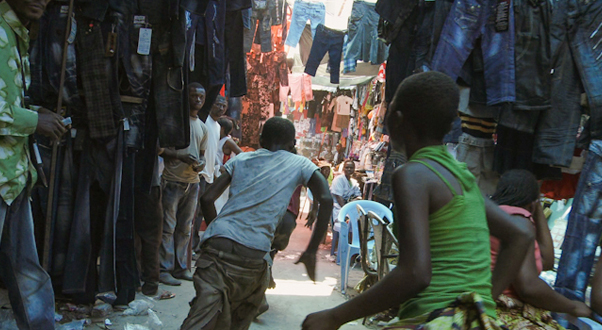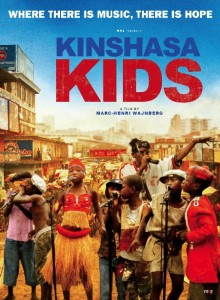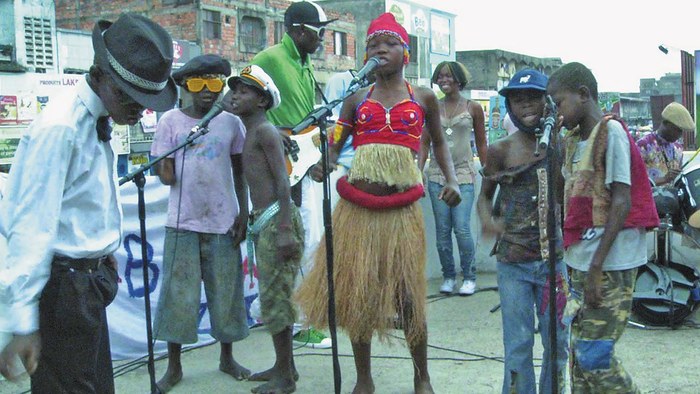Written by Marc-Henri Wajnberg
Directed by Marc-Henri Wajnberg
Kinshasa Kids introduces a surreal and hostile world right from the start in its very first scenes. It opens with an exorcism ceremony. Amidst the frantic chanting and bombastic drumbeats, village priests intone their spells and try to channel demonic influences out of inflicted children by way of animal gizzards and reptile carcasses. José (José Mawanda) is one of these unfortunate souls. His unsympathetic stepmother has accused him of bringing bad luck to their family, but he runs away before she can subject him to the unsettling process of an exorcism. Jose runs to Kinshasa, where he and thousands of children like him live on the streets, hustling, stealing, and performing to make a living.
The term for kids like José is “shegue,” and this film employs a documentary approach to tell the fictitious story of eight shegues who band together to help each other survive and, if they’re lucky, change their circumstances for the better. Before José is admitted to his group, he has to prove he can sing. Stealing, hustling, and doing odd jobs are all ways to survive the day to day, but this particular collective have bigger ambitions than just survival. They dream of leaving the constant struggle of life on the streets, and they’re counting on their musical talents to be their ticket out.
For guidance the shegues find a role model in local rap artist/fellow hustler, Bebson De La Rue (Bebson Elemba). Bebson provides the film with one of its most colorful performances. He can most often be seen urging his little prodigies to practice constantly, but his own chronic unreliability is supposedly the thing that holds back his own career from taking off. Bebson lives to make music. He devotes every free hour to rehearsing with his ensemble, and at night he bribes security watchmen with bottles of liquor to score some free studio time. But when an opportunity arises to impress Congolese music legend Papa Wemba, Bebson can’t pull his act together enough to get his equipment to the concert that could make his career. The children are disappointed in their idol, but they offer him another chance to redeem himself and them when they arrange their own community concert.
Despite the film’s inherent musicality, the editing and pacing never quite find a rhythm. In a way, its scattered structure takes away from the bigger picture. Occasionally, as focus darts quickly from one storyline to the next, an engaging scene feels robbed of its resolution. While that technique might amplify the uncertainty these characters live with in their everyday lives, it can also add to the frustration of the viewer trying to follow along empathetically.
Ultimately, however, this film succeeds unequivocally on a character level. From the enthusiastic and equally naïve youngsters to their jaded elders, the roll call of quirky personalities parading through the bustling streets makes every moment of the movie one worth watching. For instance, Josephine (Jospehine Nsimba Mpongo) makes quite a savvy screen presence. She’s a cook and business owner who runs a local outdoor restaurant and occasionally provides the shegues with delicious morsels of food in exchange for odds and ends done around her workplace. She embodies a spirit of generosity with the kids but also a wicked intellect and knack for working the system when dealing with the crooked police.
Another instant favorite is bound to be Old Django (Django Abdul Bampu Sumbu). He’s an old, nearly lame geezer who putters around town on an obnoxious motorcycle and makes his money from the sale of herbs he promises will create better sexual experiences. In reality, Django’s story barely enters the main action, but his inclusion always indicates an injection of humor and oftentimes a little naughtiness.
Kinshasa Kids strikes a tricky balance between honestly representing the deplorable conditions on the streets of the Congolese capital city and reveling in the creativity and pluckiness of some inspirational youths who refuse to buckle under personal tragedy. Against all odds, this movie ends upbeat and on a song, perhaps betraying the gritty realism of a documentary for something based more in fantasy.
Kenneth Broadway
The New York Film Festival celebrates 50 years and runs from September 28 to October 14, 2012. For a complete schedule of films, screening times, and ticket information, please see the Film Society of Lincoln Center’s official site.






